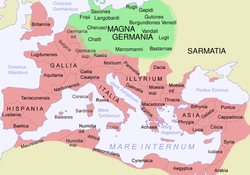Ģermānija
Jump to navigation
Jump to search
Latvian[edit]

Etymology[edit]
Via other European languages, ultimately borrowed from Latin Germānia, a term created by Julius Caesar from a Gaulish word for a group of tribes living in Northeastern Gaul (probably originally the name of one of these tribes). It was adapted to follow Latvian patterns (ģermānis + -ija).
Pronunciation[edit]
Proper noun[edit]
Ģermānija f (4th declension)
- (historical) Germania (the name given by ancient Romans and Greeks to the area in Northern Europe, east of the Rhine and north of the Danube, inhabited in ancient times by the old Germanic peoples)
- par Ģermāniju romieši sauca terioriju, ko apdzīvoja ģermāni ― the Romans called Germania the territory inhabited by the Germans (Germanic peoples)
Declension[edit]
Declension of Ģermānija (4th declension)
| singular (vienskaitlis) | plural (daudzskaitlis) | |
|---|---|---|
| nominative (nominatīvs) | Ģermānija | — |
| accusative (akuzatīvs) | Ģermāniju | — |
| genitive (ģenitīvs) | Ģermānijas | — |
| dative (datīvs) | Ģermānijai | — |
| instrumental (instrumentālis) | Ģermāniju | — |
| locative (lokatīvs) | Ģermānijā | — |
| vocative (vokatīvs) | Ģermānija | — |
Related terms[edit]
See also[edit]
Categories:
- Latvian terms borrowed from Latin
- Latvian terms derived from Latin
- Latvian terms suffixed with -ija
- Latvian lemmas
- Latvian proper nouns
- Latvian feminine nouns
- Latvian terms with historical senses
- Latvian terms with usage examples
- Latvian fourth declension proper nouns
- lv:Ancient Rome
- lv:Germany
- lv:Regions of Europe
